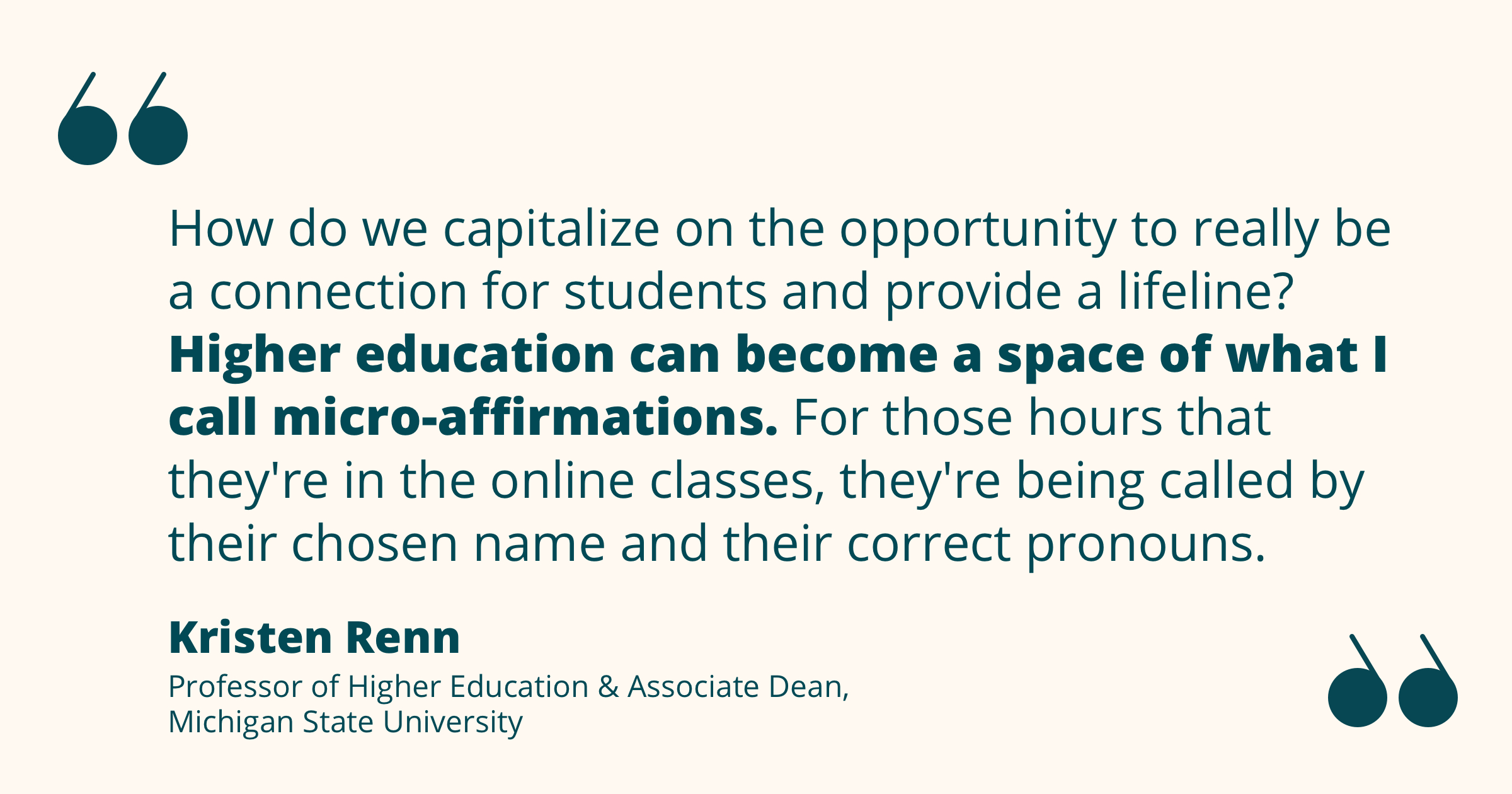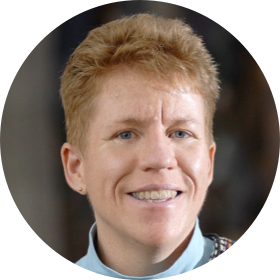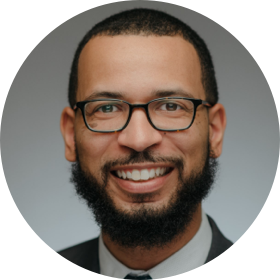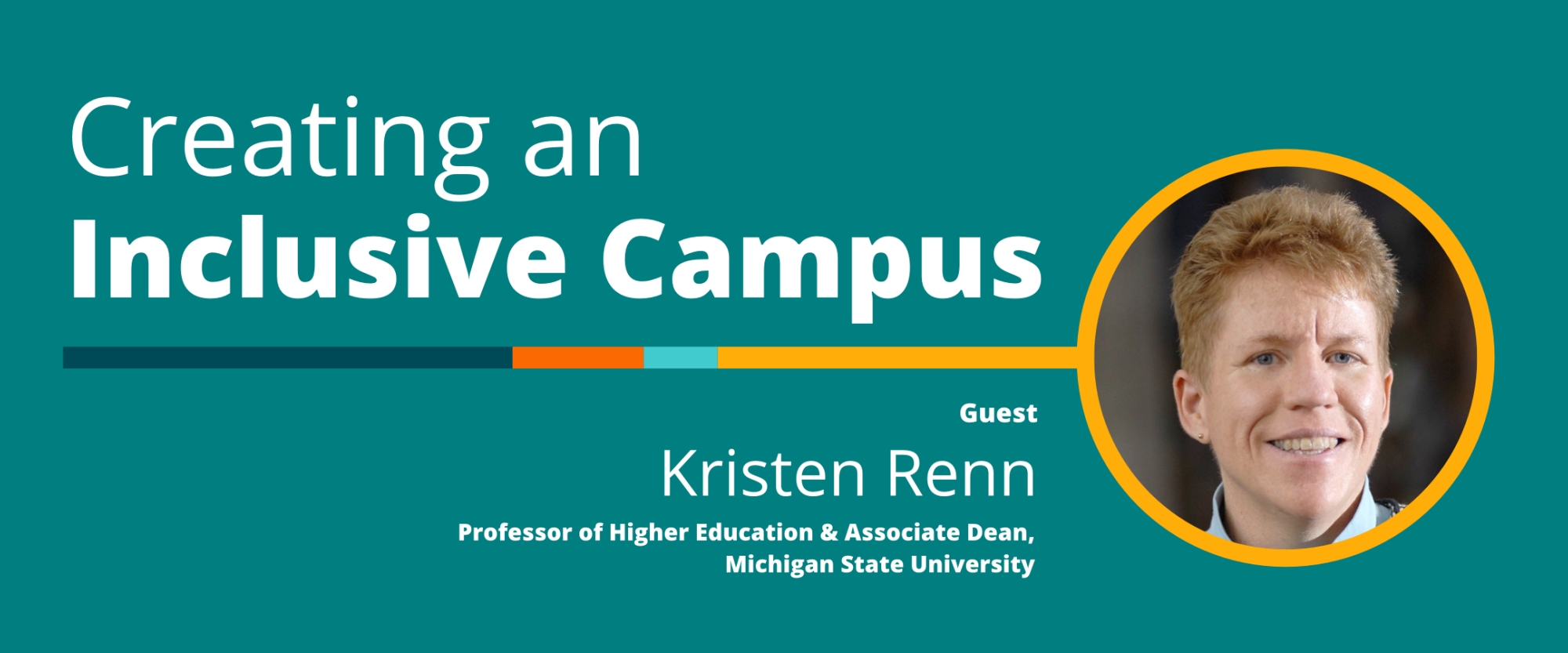Note: This interview in the Scholarship to Practice Series originally aired on November 5, 2020 as part of the University Innovation Alliance’s Innovating Together podcast, appearing live on Facebook, Twitter, and LinkedIn.
The University Innovation Alliance (UIA) is excited to bring you the Innovating Together Podcast, a collaboration with Inside Higher Ed. My co-host for Innovating Together's Scholarship to Practice series is Derrick Tillman-Kelly, Director of UIA's Fellows Program and Network Engagement, and for the 11/5/20 episode of Scholarship to Practice, we spoke with Dr. Kristen Renn, Professor and Associate Dean at Michigan State University's Department of Educational Administration. As a specialist in college student learning, development, and identities, Dr. Renn studies how students with minoritized identities – LGBTQ, students of color, low-income, or first-gen students – experience higher education and how that impacts their success. She shared her thoughts on how these students are weathering remote learning during the COVID-19 pandemic.
Navigating the Virtual Campus Climate
After acknowledging that change happens slowly in higher ed due to internal competition, lack of resources, and inertia, Professor Renn described the emergency text she received in March, 2020. "That text said 90 minutes from now Michigan State University is going to full remote teaching," she recalled, amazed at how well higher ed rose to the challenge. "There actually is more potential than I think we ever imagined for change. I'm also really aware that it's come at the expense of particular populations. Now how do we think about which students got particularly harmed in that transition, which students have left us because of that transition, which students we'll never see? How do we begin to put that back together? And how do we think about moving forward?"
Even as the pandemic has spotlighted the high percentage of students with food and housing insecurity, Professor Renn explained how current conditions are affecting LGBTQ students. "There is a fair amount of research about mental health issues for LGBTQ students and climates on campus that have not always been friendly," she said, "and how queer students need more intervention than other students. And that has absolutely been exacerbated. So for example, my campus is currently looking at name policies, where students can indicate their preferred or chosen names vs. their legal name. Because if the class roster says Sally but the person who shows up in class is John, this could out a person potentially as transgender."
Student Information, Identity, and Embodiment
"We're in the middle of a really good conversation about how to do this with our student information system," Professor Renn continued. "When our students were on campus, they experienced a lot of micro-aggressions from faculty and other students, not using their names, using the wrong pronouns. And now when students are doing college from home, the college experience – what used to happen in the buildings, in the interstitial spaces of campus – is being very much delivered through instruction. So how do we capitalize on this opportunity to really be a connection for students and provide a lifeline? Higher education can become a space of what I called micro-affirmations. For those four hours a day that they're in the online classes, they're being called by their chosen name and their correct pronouns. And then the rest of their day, they're home perhaps with a family who doesn't understand that about them. So it's a really complex landscape."

Professor Renn views these concerns about LGBTQ identity issues as a gateway to affirming the humanity of all marginalized students once campuses reopen after COVID-19. "Five years from now, how are we different and hopefully more humane?" she asked. "Certainly by paying attention to anti-Black racism that's been concurrent with the pandemic. Many campuses, most of us who've stayed remote, haven't had to deal with the embodiedness of many of our Black students on campus. So as we repopulate campus in a very embodied way, and particularly identities that are embodied identities, students with disabilities, queer students, students of color, how do we re-enter our spaces in a way that is more humane and more compassionate? That's one of the lessons I'm looking forward to implementing."
Student Experience Through Student Eyes
"Administrators live in a different campus world from students," Professor Renn observed. "At Michigan State, there are so many computer systems that I never see the student interface. For example, when computer systems started back up at the start of the year, if you were a student employee, the employee system overrode the campus system, and all of a sudden legal names were showing up for students who'd had their chosen names for years. We can attune ourselves to thinking about campus climate, looking for graffiti, homophobia, explicit things, but we don't see the ways that everyday policies and procedures affect students.
"So let's walk ourselves through a student's application process to our institution, and all of the communication, interfaces, and forms they get from us. Let's look for signs of welcome and inclusion for LGBTQ students. Let's look for things that are exclusive, that binary sex category on the application or not offering gender inclusive first-year housing. Walk through this process yourself first, because sometimes if students are with you, it's incredibly embarrassing when you notice things that you've been doing for years that are pretty easy fixes but that are just not good. Then bring students in and say, 'Where are you experiencing these things, how is this for undergrads, grad students, returning adult learners, students with intersecting identities across different categories? What are we not seeing?' I think that climate anymore isn't physical. It's emotional, it's classroom, it's digital climates."
She gave this powerful example: "We had a student panel talking to us at the start of the semester about their experiences in online learning. And they talked about what happened in the Zoom chat, and the racist and homophobic stuff that comes up. And why didn't the instructor shut it down? And then I started thinking, 'Oh my gosh, what's happening in my chat?' Now I teach pretty small classes, and every class I appoint a chat monitor because I can't run my PowerPoints, put you in breakout groups, read my chat, all at the same time. It's a lot going on. So I see where a student is seeing that, and it's horrific, right? They are being totally isolated from their peers and unable to learn the material when their identity, their humanity is being attacked in a Zoom chat. And they're thinking the instructor sees it and isn't intervening, whether or not it's intentional. So there's all these places and spaces that under typical circumstances, faculty and staff just don't know they're there, and we need to learn ways to identify and surface that."
Micro and Macro Affirmations
How would Professor Renn approach campus climate with a consultant's eye? "It doesn't cost anything to make sure that your employment and student-facing forms have non-binary options for gender," she began, "just as it didn't when we let people check more than one race. So do a policy audit to make sure that they are not just not discriminatory but affirmatively including folks and thinking about the ways that gay, lesbian, bisexual, and queer people are interacting, that all of our forms and systems are set up for that.
"And then there's some investments, like doing a campus climate study to hear student voices. That takes time and energy. There's also the investment of specific programs and services for LGBTQ students, whether that is a resource center on campus, assigned staff members, or queer-affirming members in our counseling center."
One telling indicator of school climate is student experience with campus health services. "There's that old stereotype of the health center giving you a cough drop and asking if you're pregnant," recalled Professor Renn. "Apparently that's still the case. There's a lot of inherent bias going on in student health centers, at least anecdotally. There's also some great training and great experiences reported. But making sure that in spaces where students are most vulnerable, where students are coming for help and assistance, that they have access to equitable, inclusive care.
"As for the curriculum," she went on, "faculty teach what faculty teach. But gosh, the University of Arizona managed to do a cluster hire for people doing transgender studies a few years ago. And they hired a leading expert in transgender education and two scholars in other fields. I don't know everything about the climate for trans and queer people at Arizona, but I do know they did that one amazing thing, and that sends a message to everyone. So that would be a high-end version."
For many colleges reopening after the pandemic to incorporate this rethink, Professor Renn recommends, "Start with that audit to get a sense of those easy things we could make sure are welcoming and inclusive. And of course, continue to help people with language we use. 'De-binary-izing' how we think about ourselves and our students and our staff and colleagues, I think, is a way forward for that."
Links Mentioned in This Episode
• Michigan State University
• Minoritized identities (description of social identities from Northwestern U's Searle Center for Advanced Learning and Teaching)
• LGBTQ (definition of the acronym for lesbian, gay, bisexual, transgender and queer/questioning from the Lesbian, Gay, Bisexual & Transgender Community Center)
• Binary sex category ("Understanding Gender" from GenderSpectrum.org)
Keeping Up With Dr. Kristen Renn
You can reach Dr. Renn via email at renn@msu.edu.
Bios of Guest Luminary and Co-Hosts

Guest Luminary: Kristen Renn, Professor and Associate Dean, Dept. of Educational Administration, Michigan State University
Dr. Kristen Renn is professor of Higher, Adult & Lifelong Education (HALE) in the Department of Educational Administration at Michigan State University, where she also serves as Associate Dean of Undergraduate Studies for Student Success Research. Previously, she was assistant professor of higher education and qualitative research at Southern Illinois University Carbondale, a policy analyst for the Massachusetts Board of Higher Education, and a dean in the Office of Student Life at Brown University. A Mount Holyoke College alumna, she received her Ph.D. in Higher Education from Boston College. Dr. Renn’s research interests include student success and persistence, identity, and identity development in higher education; mixed-race college students; women in higher education; and LGBTQ (lesbian, gay, bisexual, transgender, queer) issues in higher education. She is M.S.U.’s co-liaison to the UIA and co-PI on several grants related to increasing success for low-income and underrepresented students. She has been Associate Editor for International Research and Scholarship for the Journal of College Student Development, a Senior Scholar of the A.C.P.A.-College Student Educators International, and a member of the governing boards of A.C.P.A. and the Association for the Study of Higher Education (A.S.H.E.).

Co-Host: Bridget Burns, Executive Director, University Innovation Alliance
Dr. Bridget Burns is the founding Executive Director of the University Innovation Alliance (UIA). For the past decade, she has advised university presidents, system chancellors, and state and federal policy leaders on strategies to expand access to higher education, address costs, and promote completion for students of all backgrounds. The UIA was developed during Bridget’s tenure as an American Council on Education (ACE) Fellowship at Arizona State University. She held multiple roles within the Oregon University System, including serving as Chief of Staff and Senior Policy Advisor, where she won the national award for innovation in higher education government relations. She was a National Associate for the National Center for Public Policy and Higher Education, and has served on several statewide governing boards including ones governing higher education institutions, financial aid policy, and policy areas impacting children and families.

Co-Host: Derrick Tillman-Kelly, Director, University Innovation Alliance Fellows Program and Network Engagement
Dr. Derrick L. Tillman-Kelly serves as the Director of the UIA Fellows Program and Network Engagement for the University Innovation Alliance. He previously served in multiple roles at The Ohio State University, including as the inaugural UIA Fellow and special assistant to the director of the Center for Higher Education Enterprise. Dr. Tillman-Kelly earned his Ph.D. in educational policy and leadership with a specialization in higher education and student affairs from Ohio State; a master’s degree in higher education and student affairs from Indiana University; and a bachelor’s degree from Illinois Wesleyan University.
About Scholarship to Practice
Scholarship to Practice is an event series that happens live on Facebook, Twitter, and LinkedIn. It also becomes a podcast episode. We interview higher education scholars, researchers, and academics that distill how a practitioner or administrator could apply learning in real-time to improve student success. At the UIA, we know that we need to bridge that gap between scholarship and practice if we’re going to stand a chance of improving student success. We all need to work together leveraging research in the field and identifying where we need more research to support greater innovation in higher ed. With its short and conversational format, this show is designed to help bridge that gap by elevating the relevant research we all could be using in our daily lives.
Rate, Review & Subscribe
Learn why hundreds of people have rated this new podcast 5 stars! Please join others and rate and review this podcast. This helps us reach and inform more people -- like you -- to help increase the number and diversity of college graduates in the United States.
Click here, scroll to the bottom, tap to rate with five stars, and select “Write a Review.” Then be sure to let us know what you loved most about the episode! Also, if you haven’t done so already, subscribe to the podcast. We’ll be adding a bunch of bonus episodes to the feed and, if you’re not subscribed, there’s a good chance you’ll miss out.

